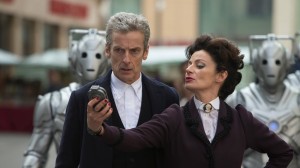 I admit it: I wondered whether Michelle Gomez would deliver anything more than an over-the-top, scenery-chewing performance as the Master. While her fake “welcome droid” routine in “Dark Water” entertained me, I wasn’t sure I wanted a second helping.
I admit it: I wondered whether Michelle Gomez would deliver anything more than an over-the-top, scenery-chewing performance as the Master. While her fake “welcome droid” routine in “Dark Water” entertained me, I wasn’t sure I wanted a second helping.
But now I want to nominate Gomez for an award. Her turn as the Master is dazzling. Her sotto voce parody of Toni Basil’s 1981 earworm—“Hey, Missy, you’re so fine!”—was only one of many highlights. I enjoyed her funny and frightening taunting of Osgood (poor Osgood!), the glee she takes in revealing herself as “the woman in the shop,” and her wicked subversion of Mary Poppins iconography. As she sways wildly in the cargo bay of the plummeting “Boat One,” she evokes memories of Jack Nicholson’s Joker a quarter century ago, and we realize we’re watching another classic villain who is equal parts brainy and “bananas.”
Gomez also hints at the Master’s emotional depth. When she tells the Doctor she simply wants her friend back, some part of me—some small part—believes her. I felt a little twinge of sympathy. Modern Doctor Who has fleshed out the Master’s backstory: the boy driven mad by his glimpse into the Untempered Schism, the man weaponized by the Time Lords (long before he—she—would learn to “weaponize the dead”) with the incessant beat of mental war drums. Nothing excuses her scheme to kill and “resurrect” all humanity as Cybermen, but it’s not too difficult to sense why, despite Clara’s angry rebuke of him for it, the Doctor has never been able to bring himself to kill the Master. Like Bilbo staying his sword and sparing Gollum in The Hobbit, the Doctor has been moved by pity.
Had the Brigadier not intervened, would the Doctor have acted differently this time? Would “saving Clara’s soul” have been counterweight enough to make him take his archnemesis’ life? I don’t know. I do know Gomez has created a fascinating and supremely entertaining character, too wonderful to waste, and I hope—since death is no obstacle for any supervillain worthy of the name—that we haven’t seen the last of her.
Amor Vincit Omnia
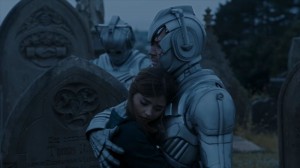 “Love conquers all,” the old motto goes. It’s a theme modern Who returns to time and again, to some fans’ chagrin. There are, however, worse themes television shows can (and do) pursue, so I’m glad this program chooses, on a regular basis, to affirm the power of love.
“Love conquers all,” the old motto goes. It’s a theme modern Who returns to time and again, to some fans’ chagrin. There are, however, worse themes television shows can (and do) pursue, so I’m glad this program chooses, on a regular basis, to affirm the power of love.
It certainly doesn’t always do so in a cheap, treacly way. Love’s victories in this episode are not easy or painless. Instead, love brings both Danny and Clara to some pretty dark places, facing only bad choices (as the Doctor recently told Clara we often do). For love of Danny, Clara “plays Doctor” one last, gut-wrenching time, sonic-ing Danny’s emotions away to free him from the emotional pain she has caused him. For love of the boy he accidentally killed while a solider, Danny sends him back from the Nethersphere, sacrificing his own chance to return from the dead.
“Love’s not an emotion,” the Doctor tells the Master. “It’s a promise.” I like that definition. It’s biblical. When Jesus calls us to love our neighbors as ourselves, he isn’t commanding us to muster up warm and fuzzy feelings for them. If we can, so much the better; but even if and when we can’t, we can still love them. We can still seek their welfare and act for their good, including and sometimes especially at the expense of our own. That’s why love isn’t Jesus’ great suggestion, but his great commandment (Mark 12.28-31).
A Coda on Clara
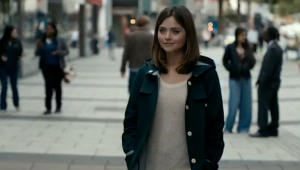 In this episode’s mid-credits “tag” scene, Santa Claus (not being overly familiar with British thespians, I was shocked to learn the actor’s name really and truly is Nick Frost—I wonder if he was hired for the part on that basis alone) insists that the Doctor and Clara’s time together “can’t end that way.” I agree, if only because I still maintain she deserves so much better. From “The Caretaker” on, we’ve watched her feed her addiction to the Doctor, becoming more and more like him. Jenna Coleman has played the arc admirably: This week we saw her channeling not only Matt Smith as she tried to fast-talk the Cybermen into believing she was the Time Lord, but also David Tennant, as she told Danny (twice, by my count), “I am so sorry.” And we see her desire to be the Doctor reaching the logical, tragic conclusion discussed earlier, wielding the sonic screwdriver to wring a “tactical advantage” from an innocent person’s inescapable death.
In this episode’s mid-credits “tag” scene, Santa Claus (not being overly familiar with British thespians, I was shocked to learn the actor’s name really and truly is Nick Frost—I wonder if he was hired for the part on that basis alone) insists that the Doctor and Clara’s time together “can’t end that way.” I agree, if only because I still maintain she deserves so much better. From “The Caretaker” on, we’ve watched her feed her addiction to the Doctor, becoming more and more like him. Jenna Coleman has played the arc admirably: This week we saw her channeling not only Matt Smith as she tried to fast-talk the Cybermen into believing she was the Time Lord, but also David Tennant, as she told Danny (twice, by my count), “I am so sorry.” And we see her desire to be the Doctor reaching the logical, tragic conclusion discussed earlier, wielding the sonic screwdriver to wring a “tactical advantage” from an innocent person’s inescapable death.
Despite Coleman’s fine acting, I still don’t accept the character’s recent trajectory as logical. This Clara is not the woman who made weekly dates with the Doctor but lived a full and healthy live in the intervals. This Clara is not the woman who called the Doctor “a hobby.” Her arc this year, in fact, strikes me as somewhat mean-spirited. Clara is now yet another strong, smart, independent woman in Doctor Who ultimately brought low and punished. Think Harriet Jones. Think Donna Noble. No, the Doctor is not directly responsible for what happened, and he’s challenged Clara on several recent occasions, urging her to reevaluate her behavior. But while she tells the Doctor traveling with him made her feel special (perhaps a more honest account of her motives than she gave to Danny in “The Caretaker”), she has now been left behind broken and alone, feeling, it seems, decidedly un-special—or perhaps special in all the wrong ways.
Who is the Doctor?
In the most recent edition (#16) of his exceptionally fine podcast Reality Bomb, Graeme Burk cautions fans against judging the show against the standard of “notional Who”—the ideal Doctor Who series that only airs in your memory and imagination. I’m probably guilty of that mistake where Clara is concerned. I’m sure I’m guilty of it concerning the Twelfth Doctor.
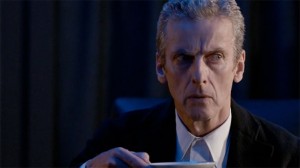 This episode does offer an answer to the season’s central question, “Am I a good man?” As answers go, though, it’s not very definitive. The Doctor decides he is neither good nor bad—just “an idiot, with a box and a screwdriver, passing through, helping out, learning.” Maybe the fault is mine, but I don’t see how this season’s events lead the Doctor to this conclusion. At several turns, he has been forced to confront his faults, to deal with his self-loathing, to shoulder responsibility for his mistakes, to say he was sorry. To some degree, he’s reclaimed his role as protector of the planet, and re-embraced it as his world, too. Why is he now pulling back from all that? The line was clearly intended to be some sort of rousing resolution to the Doctor’s year-long identity crisis, but it fell flat for me, and makes me think he has learned nothing from all that’s happened over the last dozen weeks. When he leaves Clara, he looks and acts as awkward around her as he did in “Deep Water.”
This episode does offer an answer to the season’s central question, “Am I a good man?” As answers go, though, it’s not very definitive. The Doctor decides he is neither good nor bad—just “an idiot, with a box and a screwdriver, passing through, helping out, learning.” Maybe the fault is mine, but I don’t see how this season’s events lead the Doctor to this conclusion. At several turns, he has been forced to confront his faults, to deal with his self-loathing, to shoulder responsibility for his mistakes, to say he was sorry. To some degree, he’s reclaimed his role as protector of the planet, and re-embraced it as his world, too. Why is he now pulling back from all that? The line was clearly intended to be some sort of rousing resolution to the Doctor’s year-long identity crisis, but it fell flat for me, and makes me think he has learned nothing from all that’s happened over the last dozen weeks. When he leaves Clara, he looks and acts as awkward around her as he did in “Deep Water.”
Hopefully, Santa has in his sack a proper resolution to the Doctor’s arc, too. Even if not, I’ll be watching, at Christmas and beyond. Because even if I still don’t know who this Doctor is, I know that series eight was the most engrossing, thematically intriguing, and consistently enjoyable year of Doctor Who since Matt Smith’s inaugural season in 2010. The Doctor may not come close to my “notional Who” any time soon, but I’d still rather watch this character than any other currently on TV.

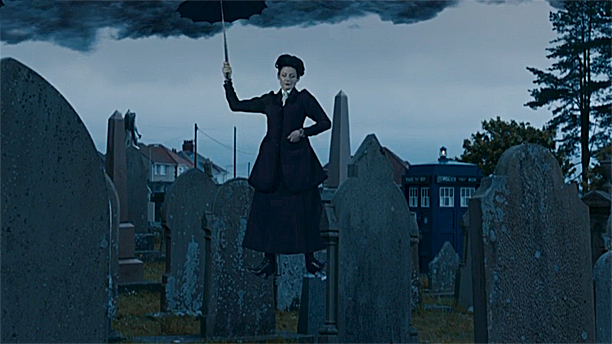
I agree with your assessment of the Doctor’s answer, “an idiot, with a box…”
This is Moffat’s doing. He seems to want the Doctor to be weak and indecisive. Sad, since this is not the Doctor we’ve been given this season.
Hi, Ellery – Thanks for reading and commenting! As I keep ruminating on the Doctor’s self-identification, the best I can figure is that it’s supposed to be “aspirational.” In other words, the Doctor has decided this is what he will be from now on. But I still don’t like it very much. Isn’t he in effect saying, “I’m gonna be an innocent bystander, more or less, not taking many risks, and so avoiding any real responsibility?” Isn’t he serving notice, “Not gonna be your hero, thanks all the same”? You are right, it is sad, because I quite enjoy Capaldi’s performances, and would rather see him say, “Yes, I am a good man, but a good man doesn’t need an army…” – if he’d just tweaked what he said about “I always have them” a little, I would’ve liked it better. But that’s Notional Who for you!
Eleventh Doctor pulled this kind of thing off better when he resolved to slink back into the shadows at the end of series six. Of course, that didn’t last long, did it?
Are you excited for the Christmas special?
Yes, looking forward the Christmas episode.
You know, maybe Moffat is attempting to create a more metamodernist Doctor. He’s not good, he’s not bad…he just ‘is’…bumbling along brilliantly through time and space, self-righteously confronting the evils of the universe while unable to confront the evils in himself.
He goes about doing ‘good’ knowing he’s not truly ‘good’.
This unresolved mystery manifests as him throwing his hands up in the air in defeat, proclaiming himself to be ‘an idiot with a box and a screwdriver.’
I think Moffat is saying that about all of us. Are we good? Are we bad? Bah! Too deep! We’re just idiots navigating our way through life (the box) doing the best we can with what we have (the screwdriver).
You may be on to something there, Ellery. Even if it’s not what Moffat is saying, I like it! It would be reinforced by his use of the Marcus Aurelius quote in “Day of the Doctor” (which was subtly setting up series 8 — clever guy): “Waste no more time arguing about what a good man should be. Be one.”
It also makes me think, somewhat, of what Jesus says our attitude about doing good should be, in Luke 17.10: “We are just unworthy servants who have done our duty.” In other words, don’t expect praise for doing good; do good because that’s what God has called you to do (Eph. 2.10).